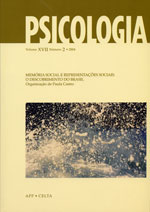Collective memories of the discovery of Brazil: Common images and differential judgements in Portuguese and Brazilian samples
DOI:
https://doi.org/10.17575/rpsicol.v17i2.448Keywords:
-Abstract
This paper deals with the updating of memory of the discovery of Brazil in the commemoration of its fifth centennial. Considering collective memory as a group of social representations concerning the past, we used as theoretical framework the psychosocial structural approach according to which the central system of a representation is linked to the collective memory and to the history of the group that sustains it. In order to collect the content of the central system and of the peripheral elements of this representation, a free evocation technique was applied to adult subjects, on April 2000, with a minimum education level of eight years, 500 being Portuguese living in Lisbon, and 789 Brazilian, distributed by five geographical areas of this country. The data were analysed using the EVOC software, specifically designed to analyse evocation data. The results obtained from the two global samples show that the central system in the social representation of the discovery of Brazil is the descriptive image massively spread in the elementary school level: the Indians, the caravels, Cabral, the sea (for the Brazilians), and the beaches (for the Portuguese). To this primordial memory is added, in a peripheral level, two other evocation orders: in the first place, the slavery and the exploration of the Brazilian wealth, evoked as a critical judgement in both samples; in the second place, and just evoked by the Brazilian sample, massacre of the Indians and the idea of invasion, to disqualify the discovery, generated recently in the polemical context of the commemoration of the fifth centennial of 1492. Instead of this last evocation, Portuguese prefer to exalt the navigators and their adventure towards the discovery of Brazil. Also, comparative results of the Brazilian sample are presented, namely education level (primary, average, superior); age (18 to 34 years, 35 to 49 years, 50 years or more); political orientation (right, left and without political definition); national or ethnic belonging (Brazilian, Latin-American, descendent of Portuguese, white, Indian and descendents, blacks and descendents). These results enable us to conclude that the structures of the representations of these subdivisions of the Brazilian sample are very similar to each other, but they present enough differences to confirm the classic idea that collective memories are as numerous as the social groups that try to remember their past or try to represent it.


